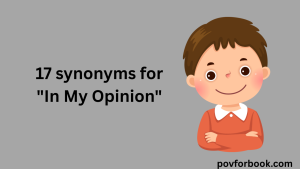When you’re writing an essay—especially a persuasive or analytical one—saying “in my opinion” over and over can become repetitive and dull. Even worse, it may sound weak or informal, especially in academic or professional settings.
But don’t worry. The English language is loaded with powerful alternatives that not only communicate your point of view but also elevate the tone of your writing. Below, we’ll explore 17 strong, context-specific, and refined synonyms for “in my opinion,” each broken down with meaning, usage, and subtle emotional tone.
Let’s learn about 17 synonyms of “In My Opinion”

1. From my perspective
This phrase is personal yet neutral, ideal for analytical or reflective essays. It signals to the reader that you’re offering your interpretation without asserting it as universal truth.
Example:
- “From my perspective, the author’s argument lacks sufficient empirical support.”
- Why it works: It softens the statement and invites readers to consider your viewpoint as one of many.
2. I believe that
This is a confident, direct substitute that expresses conviction. Unlike “I think,” it carries more emotional weight.
Example:
- “I believe that early exposure to literature enhances cognitive development.”
- Use it when you want your voice to sound strong without being aggressive.
3. It seems to me that
This is a thoughtful way of expressing opinion while suggesting openness. It makes your stance clear but leaves room for other interpretations.
Example:
- “It seems to me that the policy fails to address the root cause of poverty.”
- It’s particularly useful in critical essays where nuance matters.
4. As far as I’m concerned
Casual but not unprofessional, this phrase conveys that the upcoming statement is grounded in your personal understanding.
Example:
- “As far as I’m concerned, freedom of expression should never be compromised.”
- It’s best used sparingly in academic writing, but it shines in opinionated essays.
5. In my view
A clean, polished way to state your opinion—widely accepted in academic writing.
Example:
- “In my view, the data supports a different conclusion than the one proposed.”
- It maintains clarity while keeping the tone balanced.
6. To my mind
This British-flavored expression adds a sophisticated flair to your writing. It subtly tells the reader: “This is how I interpret things.”
Example:
- “To my mind, the character’s decisions reflect a deeper psychological conflict.”
- It adds depth when analyzing literature, theory, or abstract ideas.
7. I would argue that
This is ideal for persuasive essays. It introduces your stance with confidence while implying that a reasoned defense is coming next.
Example:
- “I would argue that banning social media in schools is a short-sighted solution.”
- It sets the stage for logical reasoning.
8. From where I stand
This one is deeply personal and subtly conveys that your background or experiences influence your perspective.
Example:
- “From where I stand, cultural awareness should be a core part of education.”
- It’s reflective and works well in narrative essays.
9. It is my contention that
A formal and powerful phrase, often used in legal, academic, or argumentative writing. It means “I firmly state.”
Example:
- “It is my contention that the evidence has been misinterpreted.”
- Use it when you want to sound authoritative and logical.
10. I’m of the opinion that
This structure adds a thoughtful, composed tone to your writing. It’s especially useful when you’re acknowledging multiple viewpoints.
Example:
- “I’m of the opinion that urban planning must prioritize public spaces.”
- It keeps things objective while clearly presenting your stance.
11. I take the position that
This signals a firm stand, often backed by detailed reasoning or evidence.
Example:
- “I take the position that artificial intelligence should be regulated internationally.”
- It’s perfect for debates, policy discussions, or academic essays.
12. It is my belief that
More formal than “I believe,” this phrase expresses conviction with a slightly softer edge.
Example:
- “It is my belief that childhood education holds the key to societal progress.”
- Use this when writing in a dignified or serious tone.
13. I hold the view that
This is confident and intellectual, a polished way of stating your belief with an academic tone.
Example:
- “I hold the view that historical context is essential for understanding modern conflicts.”
- It’s a great fit for scholarly writing.
14. My stance is that
This is direct, assertive, and clear. It works well when your point needs to be unmistakable.
Example:
- “My stance is that vaccination should be mandatory in public health emergencies.”
- Use this when you want zero ambiguity.
15. I’m convinced that
This phrase expresses a deep-rooted belief, often based on careful reasoning or compelling evidence.
Example:
- “I’m convinced that climate change is the defining issue of our time.”
- It carries emotional weight and a sense of urgency.
16. Personally speaking
Informal yet relatable, this is best used when you’re drawing from your own experience.
Example:
- “Personally speaking, I find remote work to be more productive.”
- It’s ideal for reflective or personal opinion pieces.
17. To me
Short and to the point, this phrase is less formal but deeply human.
Example:
- “To me, this novel represents the complexities of modern identity.”
- It’s subtle but allows readers to connect with your personal angle.
Summary Table – 20 Powerful Alternatives to “In My Opinion”
| Alternative Phrase | Tone | Best Used In |
|---|---|---|
| From my perspective | Neutral, personal | Reflective or analytical essays |
| I believe that | Confident, personal | Persuasive, narrative writing |
| It seems to me that | Nuanced, open-minded | Critical analysis |
| As far as I’m concerned | Casual, clear | Informal essays or strong personal opinions |
| In my view | Formal, balanced | Academic, professional writing |
| To my mind | Elegant, subjective | Literature or philosophical analysis |
| I would argue that | Strong, persuasive | Debate or argumentative writing |
| From where I stand | Personal, grounded | Narrative or reflective pieces |
| It is my contention that | Assertive, formal | Academic arguments |
| I’m of the opinion that | Polished, composed | Academic or objective pieces |
| I take the position that | Strong, logical | Persuasive or legal writing |
| It is my belief that | Formal, sincere | Philosophical or moral arguments |
| I hold the view that | Scholarly, refined | Academic papers |
| My stance is that | Direct, strong | Persuasive pieces |
| I’m convinced that | Emotional, thoughtful | Personal essays or calls to action |
| Personally speaking | Relatable, human | Informal or reflective writing |
| To me | Subtle, warm | Any casual or semi-formal context |
| I maintain that | Firm, principled | Essays with repeated argumentation |
| I assert that | Strong, confident | High-authority pieces or expert analysis |
| It is worth noting that | Subtle, objective | Analytical or research-based essays |
Final Thoughts
Replacing “in my opinion” with more thoughtful and varied expressions not only improves your writing—it shows maturity, critical thinking, and a refined understanding of tone. These 17 alternatives offer different flavors of formality, confidence, and nuance, allowing you to choose the perfect one for every context.
Whether you’re writing a school essay, a blog post, or a formal article, using these alternatives will help you sound smarter, more persuasive, and authentic—without sounding repetitive.
You may like these articles:
20 Other Ways to Say “Important”
More Than 20 Alternatives to Say “Second Chance”
500+ Words to Use Instead of “Said”
Deven Kumar is the passionate writer and founder behind povforbook.com, a website dedicated to exploring unique perspectives in literature and storytelling. With a deep love for books, language and traveling, Deven aims to inspire readers by sharing insightful reviews, thought-provoking synopses, Guiding tourist by sharing personal experience and engaging content that highlights the power of narrative. When not writing, Deven enjoys connecting with fellow book lovers and traveling lovers and continuously discovering new voices in the literary world.
